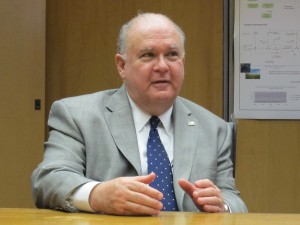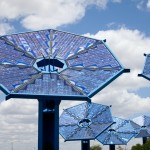Green Energy: The Army, Renewables, and Texas

Photo by Mose Buchele/StateImpact Texas
Under Secretary of the Army, Dr. Joseph W. Westphal, toured UT Austin last week.
If you happened to see an entourage of uniformed military personnel touring the University of Texas at Austin earlier this month, it might have been a visit by Dr. Joseph Westphal, the Under Secretary of the U.S. Army.
Westphal was on campus touring research facilities and talking about military-academic research partnerships. With President Obama recently touting the Department of Defense’s progress in “clean energy” in his State of the Union address, it seemed like a good time to ask the Under Secretary some questions about what the Army’s doing when it comes to renewable research.
StateImpact Texas’ Mose Buchele got the chance to speak with him after the tour.
StateImpact Texas: What role do you think the Army could play in research into renewable energy?
Westphal: Well, the Army, as well as all the services, are looking hard at how we can become more energy efficient. How we can protect the environment in a more significant fashion, and how we can address our security issues with respect to energy. Certainly the big consumers of petroleum products, like the Air Force and the Navy, have to power big ships and lots of airplanes. You know they’re very interested in biofuels. We [in the Army] are interested in how we can manage our installations, how we can better protect the environment, how we can better make use of resources. And we do a lot of research ourselves, so teaming up with a university and doing a lot of joint work really helps.
StateImpact Texas: I get the sense that some people are looking to the Armed Services to lead the way in terms of some of that research.
Westphal: Absolutely. You know one of the good things about defense and one of the bad things about defense is that we have big budgets. So people gravitate to us cause we’ve got, sometimes, the money to do some of this work. So if we do something good, for example, for tactical vehicles in terms of energy efficiency – if we do something to really improve the storage of energy, batteries – those have significant applications in terms of us as citizens, and to our communities. And so everybody benefits from it. Even though its DOD dollars that may have put that forward.
StateImpact Texas: With such a large military presence here in Texas, does this state play any special role in that research?
Westphal: Certainly. For example, at Fort Sam Houston we have a number of commands there. Installation Management Command, which manages all of our installations world wide. While we were just talking about energy, the grids, the consumption of energy, infrastructure, you know all of that is out of that command in Texas. We have some commands that help support our major combatant commands. For example, Army North is headquartered at Fort Sam Houston and Army North helps with all the aspects of homeland defense and homeland security. Disaster relief. So in that one place we have all of these major efforts taking place.
StateImpact Texas: During your tour of UT’s research facilities you asked for a report on research being done at UT on electrical grid stability. That seemed like it could serve a real strategic interest for the army.
Westphal: That project is right up the ally of things that all the services could benefit from. So that kind of modeling is very, very important. You know, here in Texas, these installations, around this county and around the world are pretty big sometimes. A lot of land and a lot of resources. And we need to be good stewards of these resources. So it isn’t just about what helps us to fight the next battle. It’s about how do we train soldiers to protect the environment, protect groundwater, protect our water resources.
This interview has been edited and condensed.
